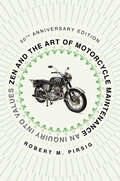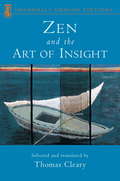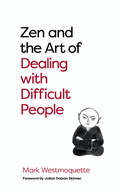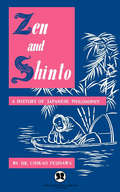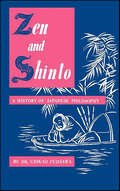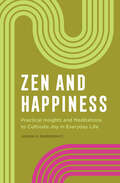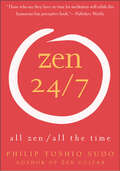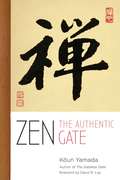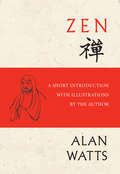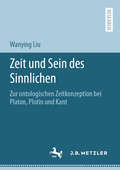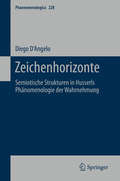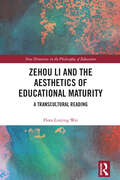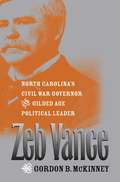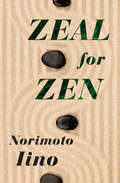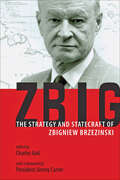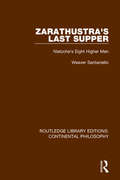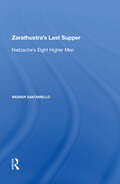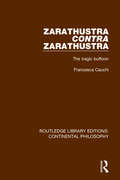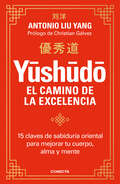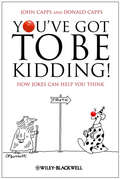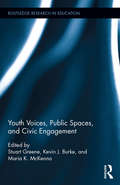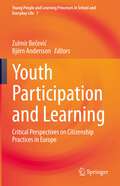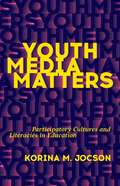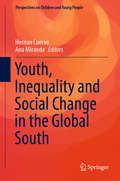- Table View
- List View
Zen and the Art of Motorcycle Maintenance: An Inquiry Into Values (Perennial Classics Ser.)
by Robert M PirsigTHE CLASSIC BOOK THAT HAS INSPIRED MILLIONSA penetrating examination of how we live and how to live betterFew books transform a generation and then establish themselves as touchstones for the generations that follow. Zen and the Art of Motorcycle Maintenance is one such book. This modern epic of a man’s search for meaning became an instant bestseller on publication in 1974, acclaimed as one of the most exciting books in the history of American letters. It continues to inspire millions. A narration of a summer motorcycle trip undertaken by a father and his son, Zen and the Art of Motorcycle Maintenance becomes a personal and philosophical odyssey into fundamental questions on how to live. The narrator's relationship with his son leads to a powerful self-reckoning; the craft of motorcycle maintenance leads to an austerely beautiful process for reconciling science, religion, and humanism. Resonant with the confusions of existence, this classic is a touching and transcendent book of life.This new edition contains an interview with Pirsig and letters and documents detailing how this extraordinary book came to be.
Zen and the Art of Insight
by Thomas ClearyThe Prajnaparamita ("perfection of wisdom") sutras are one of the great legacies of Mahayana Buddhism, giving eloquent expression to some of that school's central concerns: the perception of shunyata, the essential emptiness of all phenomena; and the ideal of the bodhisattva, one who postpones his or her own enlightenment in order to work for the salvation of all beings. The Prajnaparamita literature consists of a number of texts composed in Buddhist India between 100 BCE and 100 CE. Originally written in Sanskrit, but surviving today mostly in their Chinese versions, the texts are concerned with the experience of profound insight that cannot be conveyed by concepts or in intellectual terms. The material remains important today in Mahayana Buddhism and Zen. Key selections from the Prajnaparamita literature are presented here, along with Thomas Cleary's illuminating commentary, as a means of demonstrating the intrinsic limitations of discursive thought, and of pointing to the profound wisdom that lies beyond it. Included are selections from: * The Scripture on Perfect Insight Awakening to Essence * The Essentials of the Great Scripture on Perfect Insight * Treatise on the Great Scripture on Perfect Insight * The Scripture on Perfect Insight for Benevolent Rulers * Key Teachings on the Great Scripture of Perfect Insight * The Questions of Suvikrantavikramin
Zen and the Art of Dealing with Difficult People
by Mark WestmoquetteThis is a unique guide to coping with challenging people using practical Zen and mindfulness tools. It helps readers explore their reactions, break free from knee-jerk response patterns and see if these people may in fact prove to be useful teachers in life – troublesome Buddhas.This is a guide to applying the teachings of mindfulness and Zen to the troublesome or challenging people in our lives. Perhaps you can see there&’s often a pattern to your behaviour in relation to them and that it often causes pain – perhaps a great deal of pain. The only way we can grow is by facing this pain, acknowledging how we feel and how we&’ve reacted, and making an intention or commitment to end this repeating pattern of suffering. In this book, Mark Westmoquette speaks from a place of profound personal experience. A Zen monk, he has endured two life-changing traumas caused by other people: his sexual abuse by his own father; and his stepfather&’s death and mother&’s very serious injury in a car crash due to the careless driving of an off-duty policeman. He stresses that by bringing awareness and kindness to these relationships, our initial stance of &“I can&’t stand this person, they need to change&” will naturally shift into something much broader and more inclusive. The book makes playful use of Zen koans – apparently nonsensical phrases or stories – to help jar us out of habitual ways of perceiving the world and nudge us toward a new perspective of wisdom and compassion.
Zen and Shinto
by Dr Chikao FujisawaHow do the Japanese talk about their native philosophy, Shinto, a decade and a half after the Western Allies abolished it as a state religion? What is its relationship to Buddhism, and particularly to Zen? How modern can this very ancient creed ever be? These are some of the questions considered in this study by Dr. Chikao Fujisawa, who specialized in the study of traditional Japanese philosophy and its effect on modern society. Zen and Shinto is a strong plea to rectify the steps taken to eradicate Shinto, the very substance of Japanese life and thought. At the same time, it offers new insight into the amazing adaptability of the Japanese psyche--its depth, vitality and universality--and its remarkable capacity to assimilate foreign thought and ideas, and thus contribute to the world's hope for permanent peace.
Zen and Shinto: A History of Japanese Philosophy
by Dr. Chikao FujisawaThis history of Japanese philosophical traditions underscores the importance of Zen and Shinto to the development of Japanese culture. How do the Japanese talk about their native philosophy, Shinto, so many years after the Western Allies abolished it as a state religion? What is its relationship to Buddhism, and particularly to Zen? How modern can this very ancient creed ever be? These are some of the questions considered in this analytic work by Dr. Chikao Fujisawa, who specializes in the study of traditional Japanese philosophy and its effect on modern society. Fujisawa&’s work is not only a survey of Zen and Shinto, but also an impassioned plea to restore Shinto as the very substance of Japanese life and thought. At the same time, Zen and Shinto offers new insight into the depth and vitality of Japanese culture, demonstrating its remarkable capacity to assimilate foreign thought and ideas, and thus contribute to the world&’s hope for permanent peace.
Zen and Happiness: Practical Insights and Meditations to Cultivate Joy in Everyday Life
by Joshua R. PaszkiewiczHone your Zen practice and harness joy Life is filled with thrilling highs, crushing lows, and everything in between. But often, we spend too much time planning for and reacting to our experiences, rather than simply "being" in them. This thoughtful guide shows you how to integrate Zen traditions into your daily life so you can focus on letting go, being present, and finding bliss in the moment. What makes this a standout among Zen books: Get an insight into Zen—Learn about the foundations of Zen as you delve into its Buddhist roots, investigate a beginner's mind, and gain greater awareness of how the practice spurs self-reflection. Redefine happiness—Through the lens of Zen Buddhism, see how mindfulness observations can help you achieve greater contentment. Develop a practice—Discover a range of exercises to help you put the principles of Zen into practice, from mindful eating to walking meditations. Cultivate happiness through regular Zen practice with help from this insightful guide.
Zen 24/7: All Zen, All the Time
by Philip Toshio SudoEnlightenment is within reach -- 24 hours a day, 7 days a week.If you're searching for revelation and contentment, look no further than a handshake, a cup of coffee -- even your laundry pile. The most mundane details of life contain zen's profound truths, if you're of the mind to look for them.By awakening to and embracing the zen in your life, you'll listen, watch, eat, work, laugh, sleep, and breathe your way to truth -- every moment of every day.
Zen
by Yamada KounWhether a beginner or at the highest level of practice, learn Zen from one of the greatest masters of the twentieth century.Why practice Zen? What sets Zen apart from religion? What are its different practices? <P><P> These questions, and more, are examined and answered by Zen Master Koun Yamada, whose Dharma heirs include Robert Aitken, Ruben Habito, and David Loy. Through compelling stories and a systematic approach, he guides the reader through creating and sustaining a lifelong practice.<P> Warm and ecumenical in tone, Koun uses the insights of Zen to bring a deeper understanding of faith. Zen: The Authentic Gate is an easy-to-follow guide to creating an effortless and natural practice regardless of background, tradition, or religion.
Zen: A Short Introduction with Illustrations by the Author (Pelican Bks.)
by Alan WattsAccording to Alan Watts, “Zen taste deplores the cluttering of a picture or of a room with many objects.” In that sense, this minimalist book embodies the aesthetic of Zen itself. As with brushstrokes in a Japanese ink painting, the words have been used sparingly and arranged precisely, with no unnecessary detail. In seven brief chapters, Watts captures the essence of Zen Buddhism as a religion and a way of life. He explains fundamental Zen concepts, introduces revered Zen thinkers, places Zen within the broader context of Eastern religion, and traces the influence of Zen in the arts. Illustrated with calligraphy and drawings by the author, this reprint of an old classic will delight fans of Alan Watts, while introducing new readers to a legendary author who infused groundbreaking scholarship with literary brilliance.
Zeit und Sein des Sinnlichen: Zur ontologischen Zeitkonzeption bei Platon, Plotin und Kant
by Wanying LiuIn dem allgemeinen Denkmodus des antiken Platonismus (Platon und Plotin) und Kants wird das Sein der sinnlichen, in der Zeit existierenden Dinge apriorisch von dem als „zeitlos“ verstandenen Denken bestimmt und erfasst. Mit der Untersuchung der Grundgedanken Platons, Plotins und Kants kommt das Buch zur Konklusion, dass die apriorische Bestimmung und Erfassung des Seins in diesem Denkmodus erst durch diejenige Zeit möglich ist, die von der Autorin als „ontologische Zeit“ bestimmt wird. Die Art und Weise, wie die ontologische Zeit zu diesem Zweck dient, wird in diesem Buch erforscht. Während für den antiken Platonismus die Zeit, indem sie das Intelligible auf das Sinnliche überträgt, als das bestimmende Prinzip des Seins der sinnlichen Dinge gilt, ist der Fall bei Kant aber komplizierter, da hier die verschiedenen Aspekte des Seins unterschiedlich begründet werden müssen: die ontologische Zeit fungiert mit ihrer strukturellen Affinität zu den Kategorien als das Prinzip des Was-Seins der sinnlichen Gegenstände, während der Raum das Prinzip des Dass-Seins derselben ist, sofern die Äußerlichkeit der Raum-Zeit-Anschauungsformen in Beziehung auf den Verstand mit dem Argumentationsversuch der Autorin beseitigt wird.
Zeichenhorizonte: Semiotische Strukturen in Husserls Phänomenologie der Wahrnehmung (Phaenomenologica #228)
by Diego D’AngeloIn diesem Band deckt Diego D'Angelo semiotische Strukturen in der Husserl’schen Phänomenologie der Wahrnehmung auf. Ist es der Phänomenologie darum zu tun, die Erfahrung von Dingen in unserer Umwelt zu beschreiben, so ist dabei der Begriff des Horizontes von zentraler Bedeutung: Was wir unmittelbar wahrnehmen, verweist immer schon auf anderes, was nur „mitgegeben“ ist. Wenn wir Dinge wahrnehmen, haben wir nur eine bestimmte Perspektive, d.h. wir sehen lediglich einen Aspekt. Aber wir nehmen immer ganze Gegenstände wahr (wir sehen Tische und Stühle und andere Menschen). Jeder dieser Gegenstände erscheint in einem Feld weiterer Gegenstände, und es ist der Horizontbegriff, der es erlaubt, das Verhältnis zwischen Selbstgegebenheit und Mitgegebenheit zu explizieren.Dieses Buch stellt den ersten detaillierten Versuch dar, die Ursprünge solcher horizontaler Felder in semiotischen Strukturen zu suchen. Aus der Verbindung zwischen Husserls eigener Semiotik und seiner Phänomenologie der Wahrnehmung ergibt sich, dass das wahrgenommene Phänomen als Zeichen verstanden werden muss. Das Zeichen wiederum bezeichnet etwas, was in leiblicher Bewegung eingeholt werden kann. Mit der Verbindung von Leiblichkeit, Semiotik und Wahrnehmung thematisiert diese Monographie das Verhältnis zwischen folgenden phänomenologischen Forschungsgebieten:• Husserls Semiotik der Wahrnehmung in den Logischen Untersuchungen • Phänomenologische Raumanalyse – kinästhetische Indikation• Horizont und Noema• Passive Anzeige• Zeichen und Leiblichkeit als Grundlagen der Fremderfahrung• Genetische Phänomenologie und Semiotik der Erfahrung• Protentionen und teleologische Semiose• Induktion und Ursprung des menschlichen IchsDas Buch eröffnet die Möglichkeit, Husserls Phänomenologie jenseits einer Metaphysik der Präsenz zu verstehen. Zudem leisten D'Angelos Einzeluntersuchungen einen Beitrag zu aktuellen Diskussionen in der Philosophie der leiblichen Kognition. – Eine hilfreiche Leseempfehlung für • Interessierte Themenneulinge • Bachelor- und Masterstudenten der Geisteswissenschaften• Hochschulabsolventen sowie Forschungswissenschaftler
Zehou Li and the Aesthetics of Educational Maturity: A Transcultural Reading (New Directions in the Philosophy of Education)
by Flora Liuying WeiThis book articulates a unique conception of aesthetic educational philosophy and its relation to the Chinese world, drawing on the works of the prominent contemporary Chinese philosopher Zehou Li. The book outlines an aesthetics approach to educational maturity that recognises both the contributions of Western Enlightenment ideals and Chinese traditions, paving the way for an inclusive and post-comparative philosophy. It offers a nuanced discussion of Zehou Li’s thought and how his work can be framed at the border between traditional and modern China, between China and the West. The book combines a discussion of aesthetics with educational theory and considers their combined implications for educational practice (in particular in the first-person perspectives of students, parents, and teachers), in both local and global contexts. Providing a way of doing philosophy of education that carefully considers interactions and overlaps between Western and Chinese civilisation, the book will be of great interest to researchers, academics and postgraduate students in the fields of educational philosophy, educational theory, Chinese and cross-cultural philosophy.
Zeb Vance
by Gordon B. MckinneyIn this comprehensive biography of the man who led North Carolina through the Civil War and, as a U.S. senator from 1878 to 1894, served as the state's leading spokesman, Gordon McKinney presents Zebulon Baird Vance (1830-94) as a far more complex figure than has been previously recognized. Vance campaigned to keep North Carolina in the Union, but after Southern troops fired on Fort Sumter, he joined the army and rose to the rank of colonel. He was viewed as a champion of individual rights and enjoyed great popularity among voters. But McKinney demonstrates that Vance was not as progressive as earlier biographers suggest. Vance was a tireless advocate for white North Carolinians in the Reconstruction Period, and his policies and positions often favored the rich and powerful.McKinney provides significant new information about Vance's third governorship, his senatorial career, and his role in the origins of the modern Democratic Party in North Carolina. This new biography offers the fullest, most complete understanding yet of a legendary North Carolina leader.
Zeal for Zen
by Norimoto IinoThe Zen scholar and author of Hints in Haiku offers a revealing introduction to Zen thought and practice in this collection of essays. In 1964, when he accepted a visiting professorship at Coe College teaching non-Western studies, Norimoto Iino wrote this uniquely insightful introduction to Zen for his students. As he says in the preface, &“Zen is a subject notoriously elusive. It goes beyond the happiest form of linguistic expression.&” And yet, Iino pursues his topic with illuminating clarity and probing insight. In Zeal for Zen, Iino discusses Zen as an ever-evolving way of seeing and a powerful antidote to the egoistic pursuit of power. He covers a wide range of topics, from Soto Zen and Zen prayer to mathematics, modern physics, and the Zenlike works of English philosopher Alfred North Whitehead.
Zbig: The Strategy and Statecraft of Zbigniew Brzezinski
by Charles GatiThe first comprehensive account of Zbigniew Brzezinski's complementary roles as author, academic, policy maker, and critic.Zbigniew Brzezinski’s multifaceted career dealing with U.S. security and foreign policy has led him from the halls of academia to multiple terms in public service, including a stint as President Jimmy Carter’s National Security Advisor from 1977 to 1981. He is a renowned policy analyst and author who frequently appears as a commentator on popular talk shows, and his strategic vision continues to carry a great deal of gravitas. in Zbig, Charles Gati has enlisted many of the top foreign policy players of the past thirty years to reflect on and analyze Brzezinski and his work. A senior scholar in Eastern European and Russian studies, Gati observed firsthand much of the history and politics surrounding Brzezinski’s career. His vibrant introduction and concluding interview with Brzezinski frame this critical assessment of a major statesman’s accomplishments.Contributors: Justin Vaïsse, David C. Engerman, Mark Kramer, David J. Rothkopf, Warren I. Cohen and Nancy Bernkopf Tucker, Robert A. Pastor, William B. Quandt, Robert Hunter, James Thomson, Patrick Vaughan, Marin Strmecki, James Mann, David Ignatius, Adam Garfinkle, Stephen F. Szabo, Francis Fukuyama, Charles Gati
Zarathustra's Last Supper: Nietzche's Eight Higher Men (Routledge Library Editions: Continental Philosophy #11)
by Weaver SantanielloThis book, first published in 2005, explores the historical contextualization of Nietzsche’s thought, focusing on his controversial Thus Spoke Zarathustra. The fourth part of Nietzsche’s Zarathustra consists of Zarathustra’s encounter with eight ‘higher men’ whom Zarathustra meets in succession on his path. The prophet then invites each individual to his cave for the evening festivities, culminating in a blasphemous festival in which his guests worship an ass as God. Revealing each guest’s specific characteristics and distinct roles, the author attempts to discern ‘who’ these guests are or represent (historically) through glimpsing the characteristics specific to each guest.
Zarathustra's Last Supper: Nietzsche's Eight Higher Men
by Weaver SantanielloThis book explores the historical contextualization of Nietzsche's thought, focusing on Nietzsche's controversial Thus Spoke Zarathustra. The fourth part of Nietzsche's Zarathustra consists of Zarathustra's encounter with eight 'higher men' whom Zarathustra meets in succession on his path during the day. The prophet then invites each individual to his cave for the evening festivities, culminating in a blasphemous festival in which his guests worship an ass as God. Revealing each guest's specific characteristics and very distinct roles, Santaniello also attempts to discern 'who' these guests are or represent (historically) through glimpsing the characteristics specific to each representative guest (as portrayed by Nietzsche), and through careful textual analysis, comparison with Nietzsche's other works, historical evidence, and previous scholarly research. This unique exploration of Thus Spoke Zarathustra offers students and researchers alike an invaluable new contribution to Nietzsche studies.
Zarathustra Contra Zarathustra: The Tragic Buffoon (Routledge Library Editions: Continental Philosophy #10)
by Francesca CauchiThis study, first published in 1998, makes a lively and welcome contribution to the critical analysis of Nietzsche’s seminal classic This Spoke Zarathustra. Through a close textual reading of the neglected and ill-understood part four of the text, the author seeks to show that Nietzsche’s project of self-overcoming is a failure. Offering herself as a philosopher-priestess of the wisdom of pessimism, Francesca Cauchi invokes a complex of responses in the reader, providing a necessary challenge to any and all advocates of life.
Yūshūdō. El camino de la excelencia: 15 claves de sabiduría oriental para mejorar tu cuerpo, alma y mente
by Antonio Liu YangUn manual práctico para aprender a ser mejor cada día y alcanzar la excelencia en tu vida personal y profesional aplicando la sabiduría oriental de forma fácil y amena. ¿Sabías que puedes aplicar la sabiduría oriental para mejorar día a día? En este libro, el facilitador intercultural Antonio Liu Yang te guiará por el camino de la excelencia a través de técnicas de la filosofía oriental de manera cercana y realista.Yushudo te ayudará a: *Progresar cada día a través de la filosofía japonesa del kaizen *Mejorar profesionalmente aumentando tu nunchi *Tener buenas relaciones interpersonales con la ayuda del guanxi *Trabajar tus valores creando tu propio bushido *Estar en armonía con tu entorno de acuerdo con los cánones del arte del Feng Shui *Superar las adversidades mediante el kintsugi*Reflexionar cada día con la técnica del hansei *Vivir acorde con tu do, tu propósito de vida Emprende hoy mismo el camino de la excelencia para mejorar tu cuerpo, tu alma y tu mente aplicando 15 sencillas claves de la sabiduría oriental. Reseñas:«Leer este libro te ayudará a mejorar tu vida aplicando conceptos que llevan siglos desarrollándose en Oriente».Amadeo Jensana, Director de programas económicos en CASA ASIA «Los valores, creencias y conceptos del mundo asiático explicados de una manera sencilla y fácil de entender. Esta guía puede marcar un antes y después en tu vida».Anna Zelno, socia fundadora de la Academy for diversity and innovation«Una guía oriental para mejorar tu vida occidental».María Ángeles Blanco, Fundadora y CEO de Escuela de chino Bai «Un libro excepcional con el que aproximarte a la sabiduría oriental. Su lectura es un puente entre Oriente y Occidente que sin duda te permitirá mejorar».Fernando Molina, Presidente del Instituto Seda España «Un libro repleto de claves para una vida plena y eficaz».Vero López, Fisio experta en medicina china y escritora«Antonio Liu Yang es el puente intercultural que necesitamos para transitar el camino a la excelencia».Iván E. Fernández Fojón, Presidente de la asociación cultural coreana Hwarang «Nadie mejor que Antonio Liu Yang para acercar la inmensa sabiduría oriental a los occidentales.Un libro ameno y tan interesante como práctico».Carlos Marcuello Recaj, consultor y profesor de Internacionalización «No tengas prisa por terminar este libro, porque Yushudo se aprovecha mejor si se disfruta con tranquilidad, como una buena ducha que calma y purifica».Pello Zuñiga, Ex Head of User Marketing and Social Media Management en Aliexpress«Un libro claro, práctico, que acerca de manera simple la sabiduría oriental a nuestra realidad occidental ayudando a crear un mundo con mejores valores universales».Ginés Haro, emprendedor social «Este libro detalla de una manera muy práctica y amena aquellos conceptos culturales de Asia-Pacífico quepueden ayudarnos a conseguir una vida más ordenada y plena».Hyun Lee Park, formadora intercultural especialista en la cultura coreana «Esto no es un libro, es una pura gema. Antonio ha conseguido simplificar conceptos asiáticos muy complejosy únicos en frases que todo el mundo puede entender».Jun Wei Du, abogado chinadesk y especialista en LegalTech
You've Got To Be Kidding!: How Jokes Can Help You Think
by John Capps Donald CappsYou've Got to Be Kidding!: How Jokes Can Help You Think is a thoughtful and accessible analysis of the ways in which jokes illustrate how we think critically, and how the thinking process goes awry in everyday human situations Uses jokes to illustrate the various mistakes or fallacies that are typically identified and discussed in courses on critical reasoning Provides an effective way to learn critical thinking skills since jokes often describe real-life situations where it really matters whether a person thinks well or not Demonstrates how philosophy is actually very practical and clearly related to real- life human experiences Explains how developing good reasoning habits can make a real difference in all aspects of one’s life
Youth Work
by Naomi NicholsCombining institutional ethnography and community-based research, Youth Work is a sophisticated examination of the troubling experiences of young people living outside the care of parents or guardians, as well as of the difficulties of the frontline workers who take responsibility for assisting them. Drawing from more than a year of on-site research at an Ontario youth emergency shelter, Naomi Nichols exposes the complicated institutional practices that govern both the lives of young people living in shelters and the workers who try to help them.A troubling account of how a managerial focus on principles like "accountability" and "risk management" has failed to successfully coordinate and deliver services to vulnerable members of society, Youth Work shows how competitive funding processes, institutional mandates, and inter-organizational conflicts complicate the lives of the young people that they are supposed to help. Nichols's book is essential reading for those involved in education, social services, mental health, and the justice system, as well as anyone with an interest in social justice.
Youth Voices, Public Spaces, and Civic Engagement (Routledge Research in Education #159)
by Stuart Greene Kevin J. Burke Maria K. McKennaThis collection of original research explores ways that educators can create participatory spaces that foster civic engagement, critical thinking, and authentic literacy practices for adolescent youth in urban contexts. Casting youth as vital social actors, contributors shed light on the ways in which urban youth develop a clearer sense of agency within the structural forces of racial segregation and economic development that would otherwise marginalize and silence their voices and begin to see familiar spaces with reimagined possibilities for socially just educational practices.
Youth Participation and Learning: Critical Perspectives on Citizenship Practices in Europe (Young People and Learning Processes in School and Everyday Life #7)
by Zulmir Bečević Björn AnderssonThis book contributes to the studies on learning processes occurring outside “traditional” socialization settings such as family and school, by analysing civic and political participation and learning experiences. In this perspective, the book delves into the connections between the concepts of learning and participation and, in various ways and from different perspectives, critically interrogates learning and participation as interrelated phenomena, with the aim of revealing complexities implicated in pathways to adulthood. Being interdisciplinary in its nature (contributors come from disciplinary backgrounds such as educational sciences, child and youth studies, social work, sociology and political science), the volume provides an up-to date analysis of contemporary issues connected to youth participation and learning. The work taps into central areas of everyday life of young people and youth meaning-making and generates and presents qualitative knowledge about what it means to be young in Europe today.
Youth Media Matters: Participatory Cultures and Literacies in Education
by Korina M. JocsonIn an information age of youth social movements, Youth Media Matters examines how young people are using new media technologies to tell stories about themselves and their social worlds. They do so through joint efforts in a range of educational settings and media environments, including high school classrooms, youth media organizations, and social media sites. Korina M. Jocson draws on various theories to show how educators can harness the power of youth media to provide new opportunities for meaningful learning and “do-it-together production.” Describing the impact that youth media can have on the broader culture, Jocson demonstrates how it supports expansive literacy practices and promotes civic engagement, particularly among historically marginalized youth.In Youth Media Matters, Jocson offers a connective analysis of content area classrooms, career and technical education, literary and media arts organizations, community television stations, and colleges and universities. She provides examples of youth media work—including videos, television broadcasts, websites, and blogs—produced in the San Francisco Bay Area, Los Angeles, New York, and St. Louis. At a time when educators are increasingly attentive to participatory cultures yet constrained by top-down pedagogical requirements, Jocson highlights the knowledge production and transformative potential of youth media with import both in and out of the classroom.
Youth, Inequality and Social Change in the Global South (Perspectives on Children and Young People #6)
by Hernan Cuervo Ana MirandaThis book gathers international and interdisciplinary work on youth studies from the Global South, exploring issues such as continuity and change in youth transitions from education to work; contemporary debates on the impact of mobility, marginalization and violence on young lives; how digital technologies shape youth experiences; and how different institutions, cultures and structures generate a diversity of experiences of what it means to be young. The book is divided into four broad thematic sections: (a) Education, work and social structure; (b) Identity and belonging; (c) Place, mobilities and marginalization; and (d) Power, social conflict and new forms of political participation of youth.
